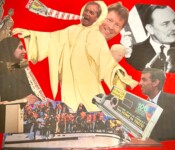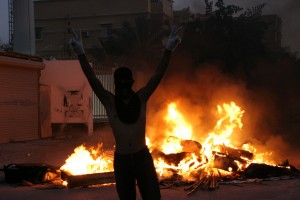Is Dialogue in Bahrain Genuine or just Cosmetic?
It has been two years since the start of the uprising in Bahrain. Back then in 2011, thousands of Bahraini went into the streets of the small island kingdom demanding political reforms and civil rights following similar protests in other Arab countries like Tunisia and Egypt.
Since then, demonstrations in Bahrain continued as the level of violence increased. Dozens of Bahrainis have been killed since 2011 by the security forces and hundreds were injured. Thousands were arrested and many are still detained according to international human rights organisations.
Amidst this crisis, Bahraini King, Hamad bin issa al-Khalifa, called for a new round of talks with opposition parties to solve the two-year political deadlock in the country. Almost all main political groups agreed to take part in the talks including AL Wefaq, the largest opposition groups in the country which is leading the demonstrations.
There have been several talks held in the past two years between the government and the opposition parties but with no real success. So is this new round of talks genuine or just cosmetic while violence continues?
Abdel Jalil Khalil, head of Bahrain’s major opposition party and former MP, says that the situation has not moved from square one since the day of the attack by security forces on protesters at in the Capital Manama in March 2011.
A few days after talks began with the government, he said that the government “continues to use the security path instead of the political one” and that it is “still using violence against peaceful protesters”despite what was published in the report by the Bahrain Independent Commission of Inquiry. The report talked about the use “excessive force” by the security forces against “peaceful protesters” which resulted the killing of more than 50 protesters.
He added: “What we see now happening by the security forces in the cities and villages of Bahrain, clearly indicates that the BICI report has not been implemented despite international condemnations. The regime continues to kill, arrest and prosecute protesters in a provocative way.”
When asked if this continuation of using violence is a reflection of what is happening on the dialogue sessions, Khalil said: “The opposition’s position is clear about the dialogue as it wants to find a solution for the crisis through a serious dialogue not cosmetic.”
The Bahraini opposition says that the previous round of dialogue in 2011 failed because it was not a serious one. Khalil said: “Those who see the security path as the only way to solve the crisis, they find themselves in dilemma while setting on the dialogue table. The people of Bahrain have clear demands; they want a real change of the political system in the country, a democratically elected government and Parliament, a fair electoral system and an independent judiciary. But the regime has not met these demands as it does not have a real will to make real changes.”
Khalil says that the dialogue is “in trouble” as the King refuses to participate in the talks while the opposition insists to have a representative of the King, not only of the government. Khalil said: “In order for the dialogue to success, the King and the regime have to be part of the dialogue. Any results out of the dialogue must go for a referendum. And there must be a clear mechanism for implementing the results of the dialogue.
“There must be a road map to get out of the ongoing crisis. In the opposition, we don’t go for dialogue to agree on superficial solutions that do not solve the core issue, which is the principle of people are the source of authority. We want a real dialogue that meets the aspiration of the Bahraini people. People will not be happy with any kinds of results out of the dialogue and it will not stop protests. People want real results,” he said.
The Bahraini King also announced that no referendum will be held on the results of the dialouge, which drew criticism from opposition groups. Abdel Nabi Salman, Secretary General of the opposition Progressive Democratic Forum Society and former MP said that this announcement by the King is “counterproductive”.
He said: “The announcement by the King’s office that there is no representation on behalf of the King on the dialogue table and no referendum to be held on the outcome of the dialogue sessions, is a very counterproductive issue. This is a negative interference on the dialogue and it does not help the negotiators at all.”
He added: “Saying that no referendum to be held is a very serious concern for us but we have to deal with it objectively, rationally and not with instant reactions. The opposition parties understand that we are all now facing an important time for Bahrain and we have to help to push things forward. We don’t have to look at those who are putting obstacles for the dialogue whether from inside the sessions or outside.”
But some other Bahrainis look at the developments of the talks differently. Abdel Hadi Khalaf, a prominent political activist and senior lecturer at Lund University in Sweden says that it is “bizarre” that the leaders of the opposition parties are expecting something to come out of the dialogue with the regime.
He said that the government looks at the dialogue as “a public relations party” as it “doesn’t want” to answer the demands of the opposition. He added that the opposition parties are invited to the dialogue by the government just to complete the picture but not to agree on how to get out of the current crisis in the country.
Khalaf said: “The people are expecting a stronger position from the opposition as the government is pressuring the opposition to make decisions which suits the government’s direction. The opposition must go with the demands of the streets. People do not want more dialogues similar to previous ones. Since 2001, we have been talking to the government and to the King and his family but the government has always broken its promises.”
He added: “As long as the game is not changed, there isn’t any hope now that the government is going to meet its promises this time unless there are guarantees from the international mediators like the Americans.”


























